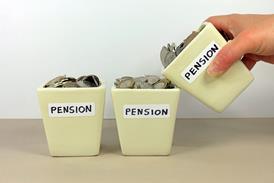I want to correct a number of inaccuracies and misconceptions in David Brooks' online article last week.
Generalisations about the 'baby boomer' generation as uniformly affluent beneficiaries of final salary schemes are highly misleading. About 30 per cent of people between the ages of 55 and 64 have no private pension wealth, rising to a third for 65 and over.
The average defined benefit pension is about £8,000 a year, which taken with the state pension is enough for an adequate, but not a luxury lifestyle. Peak birth years in the UK were from the end of the war to 1949 and again in the early 1960s. To describe anyone born in the 1950s, a decade of low birth rates, as a 'baby boomer' is lazy and inaccurate.
That some pensioner households are better off than working age households is not surprising where at least one member is working and drawing pensions at the same time, and their home is owned without a mortgage – which they may have spent decades in repaying at much higher interest rates than today.
It is disingenuous to complain about the income effects of working beyond pension age when this is public policy. Older pensioners of course tend not to work and have lower household incomes.
House price rises are regionally biased to the south east of England and of course to home owners. However not all older people own their homes outright, but even if they do, that should not be a cause for criticism when house price bubbles have been encouraged by public policy.
The triple lock applies only to the state basic pension of a weekly £122.30, an increase of £3 this year or about the price of a coffee, which is hardly generous. The Trades Union Congress has pointed out that the loss of the triple lock applied to one of the lowest state pensions in advanced economies would disadvantage younger workers most.
There is no evidence that the cost of defined benefit schemes has been at the expense of younger workers when you consider that dividend payments outstrip deficit payments by a multiple of three to five. Cutting pensions would not just be unfair, it is illegal, and both the Pensions Regulator and the government are satisfied that DB promises are manageable and affordable.
The issue is one of extreme inequality. The UK is a highly unequal society where nearly half of pension wealth belongs to the top 10 per cent and two-thirds to the top 20 per cent, which makes the UK an outlier in advanced societies with the US and Portugal. To frame it as an intergenerational issue is a cynical diversion.
Ken MacIntyre, Leatherhead, UK
If you want to submit a letter, send it to:
Sandra Wolf, editor
Pensions Expert
Financial Times
One Southwark Bridge
London
SE1 9HL














